His Holiness Patriarch Kirill meets with a delegation of religious figures and scholars from Iran
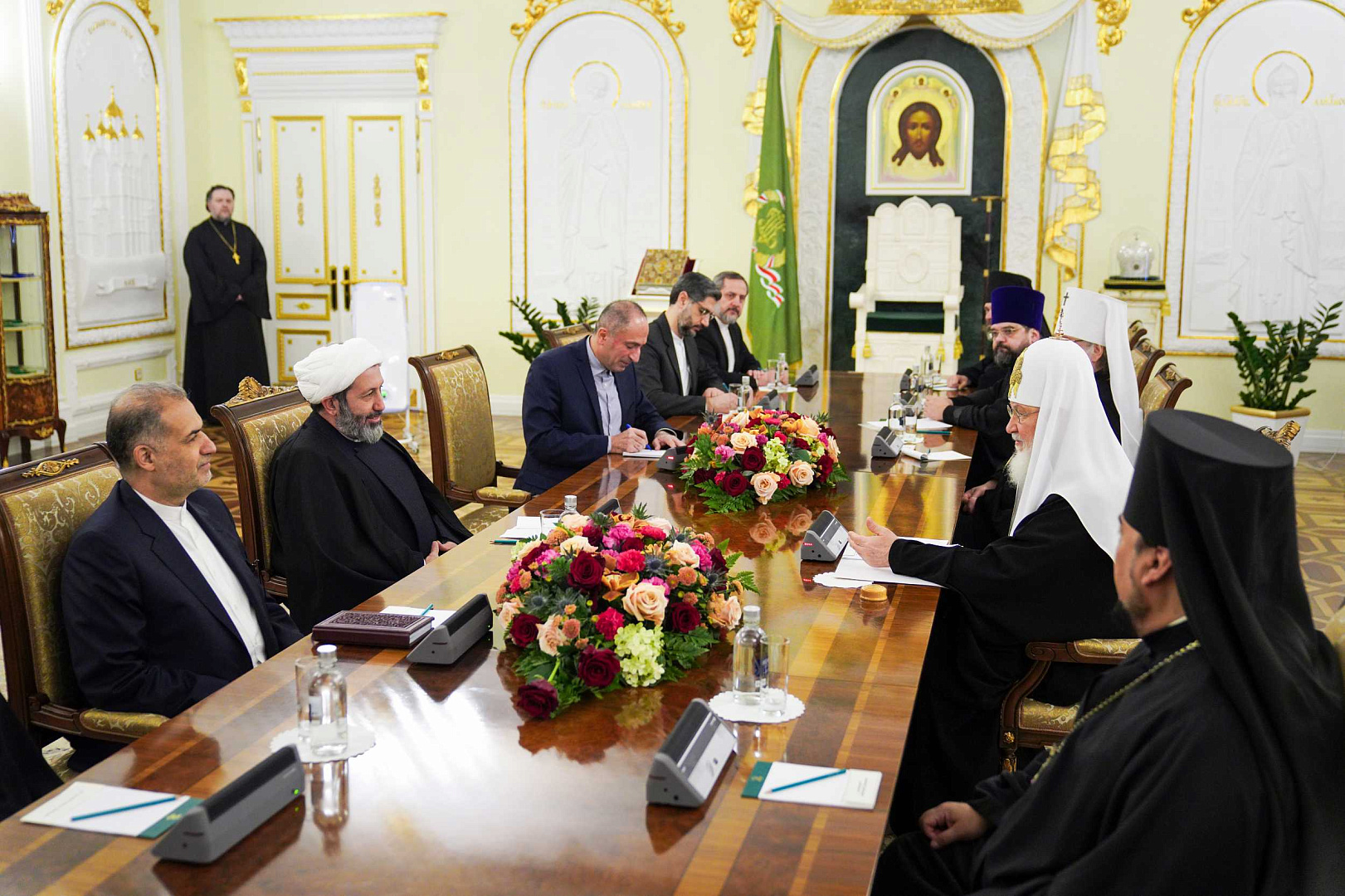
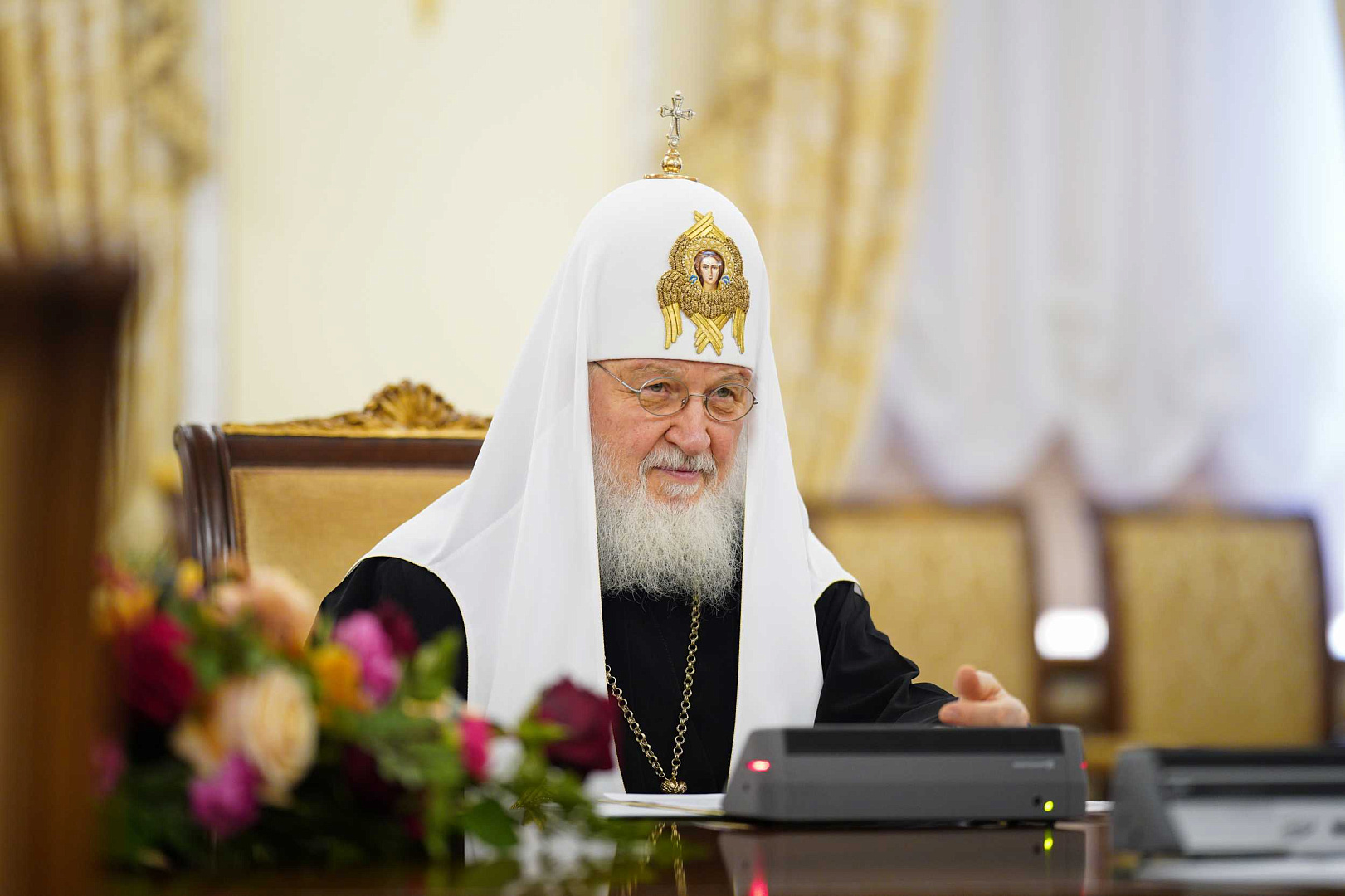
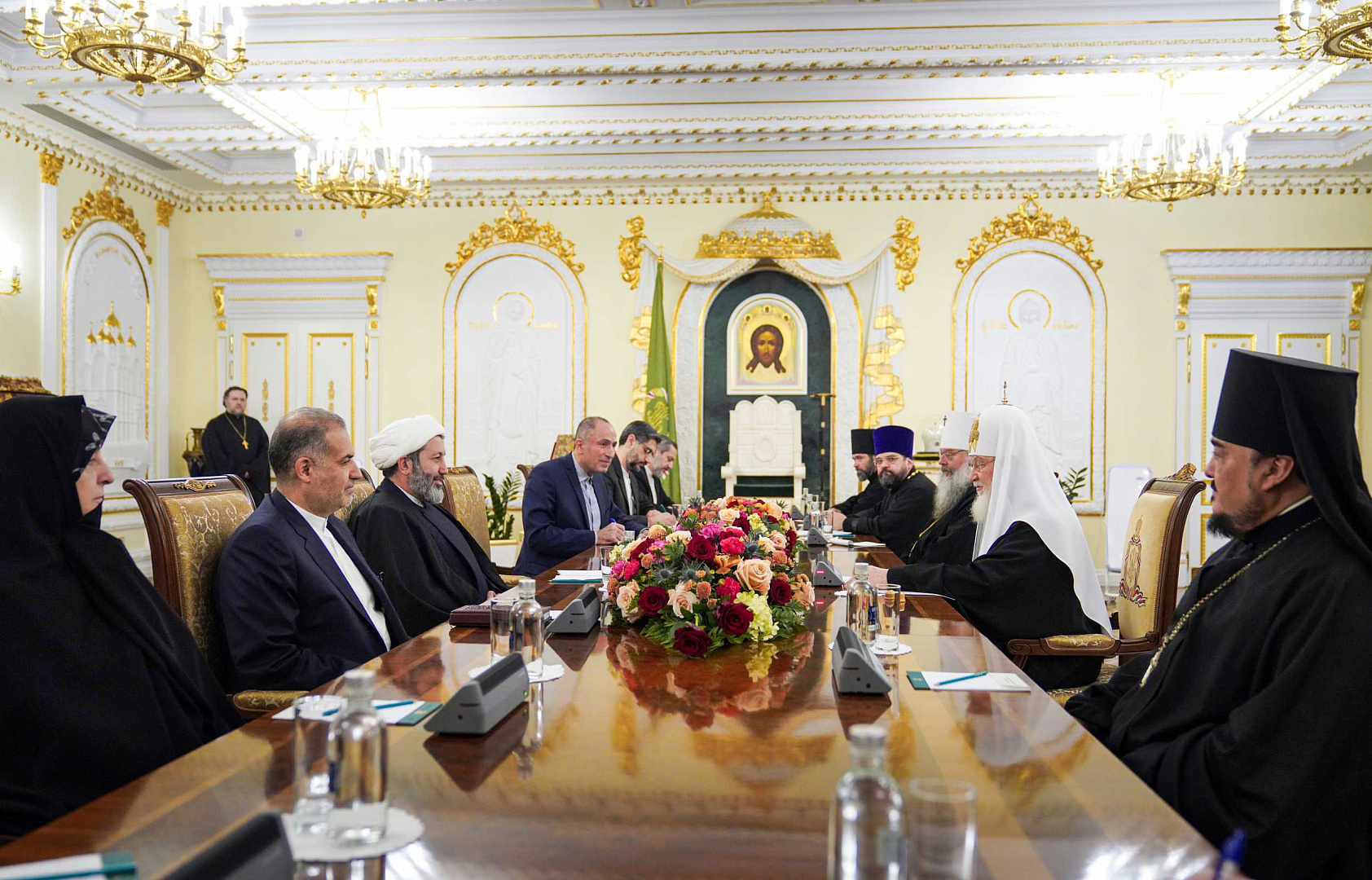
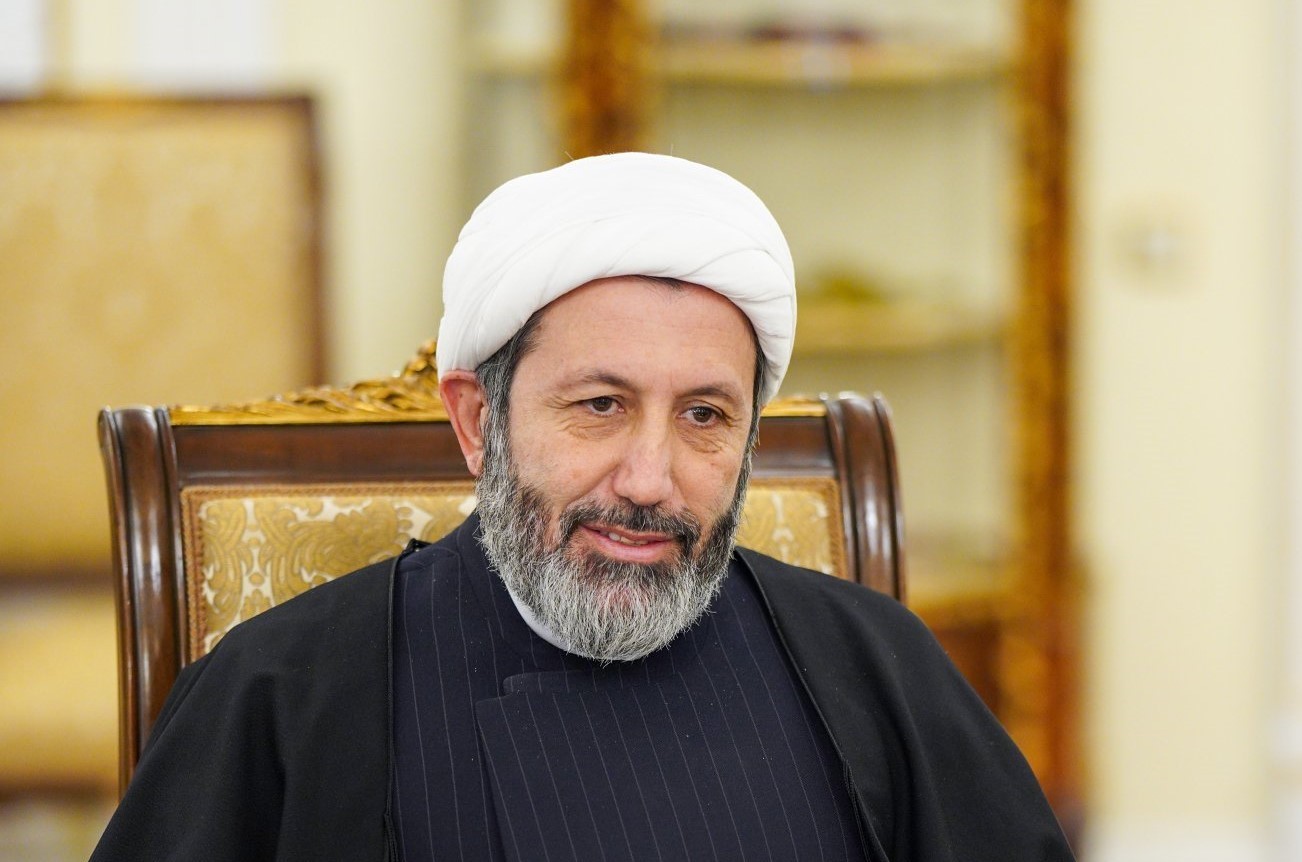
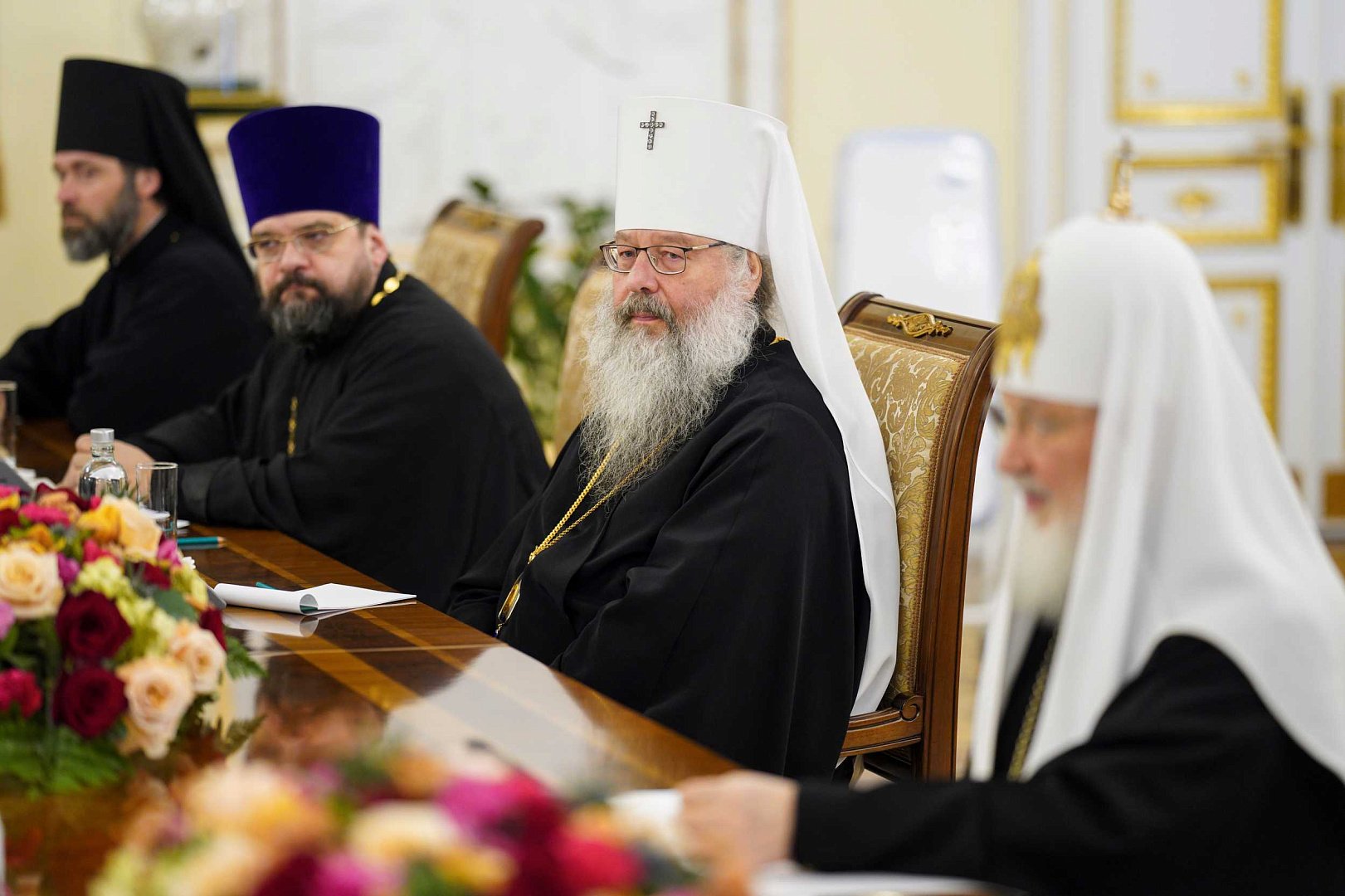
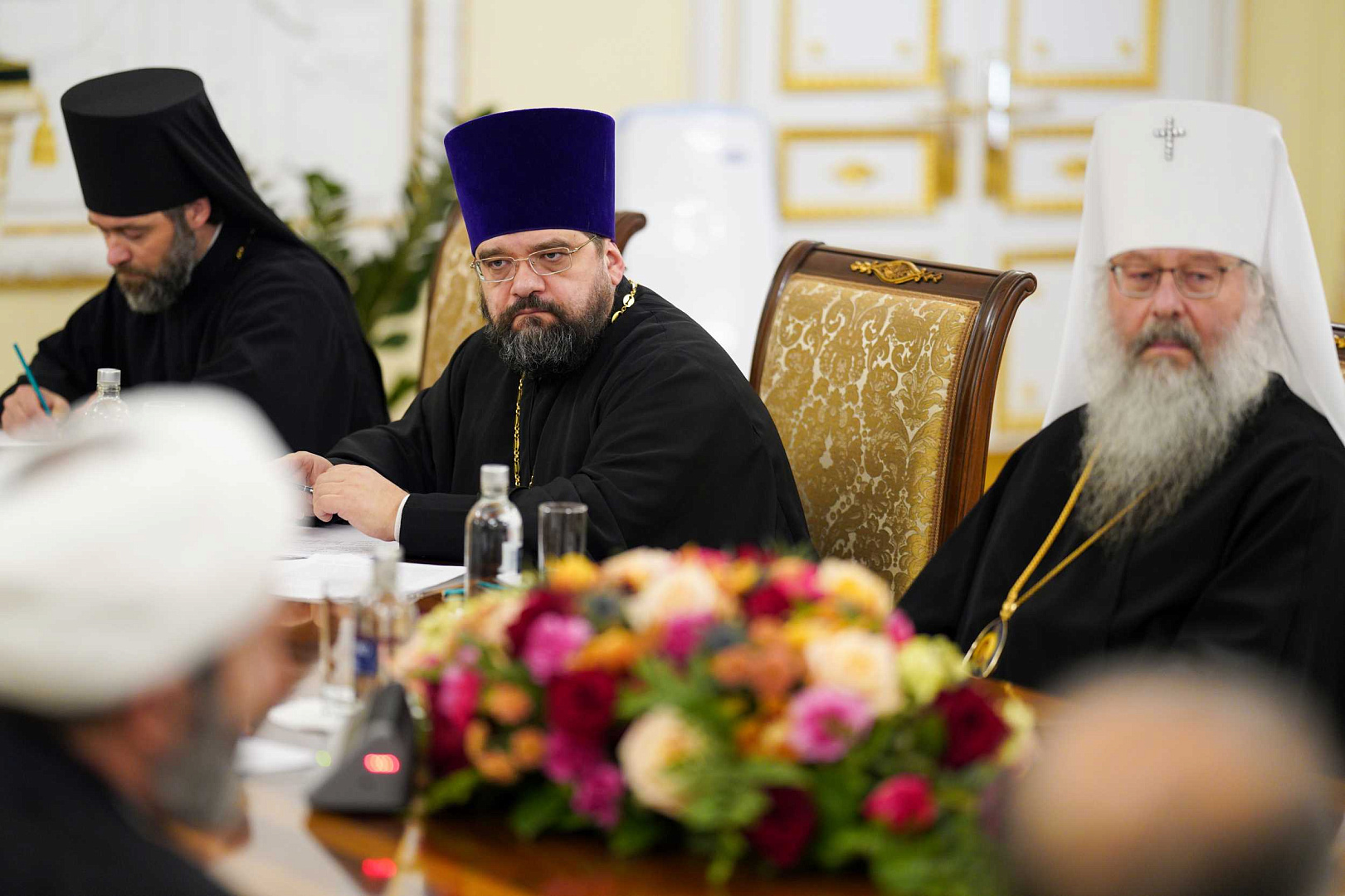
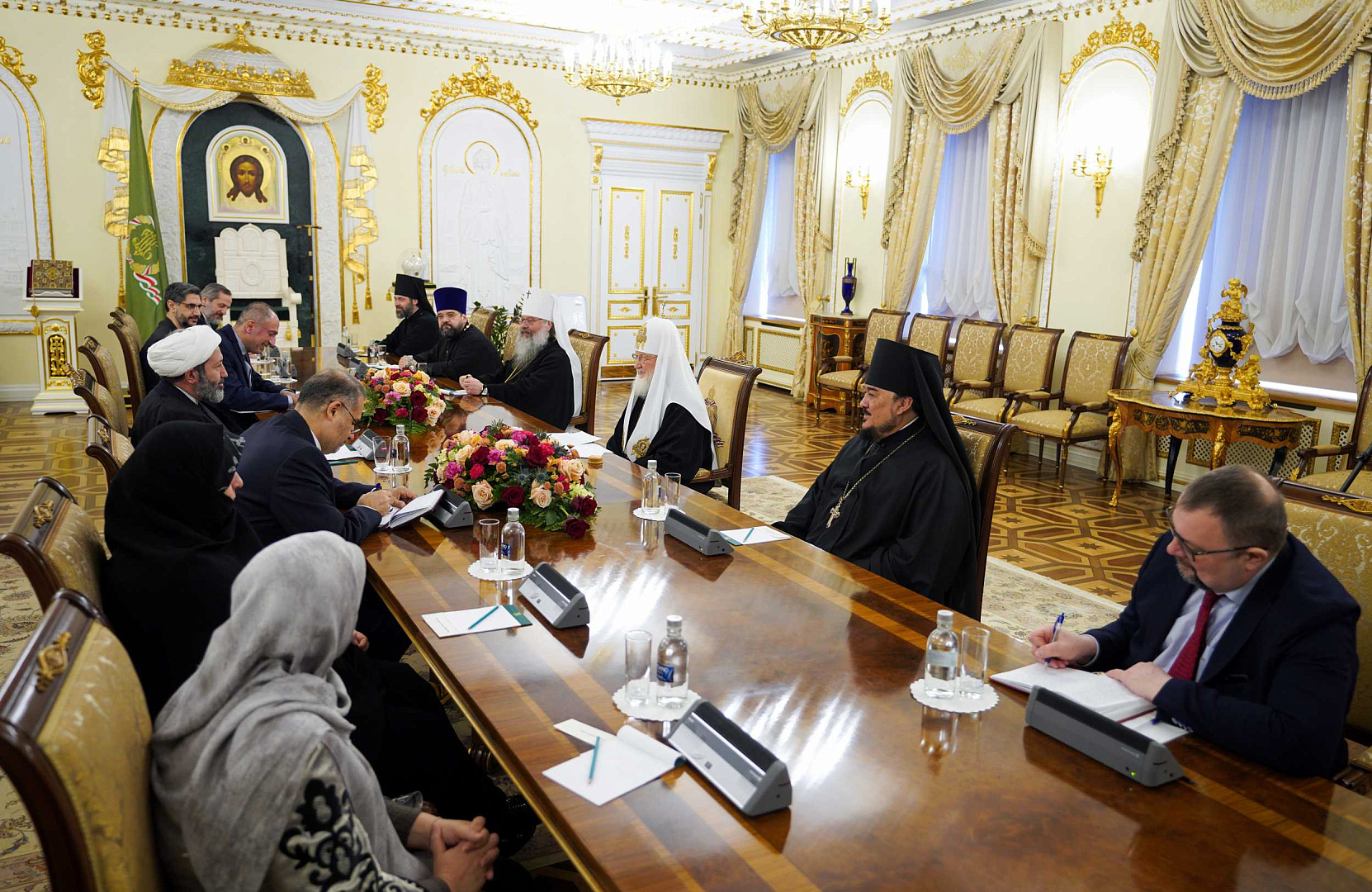
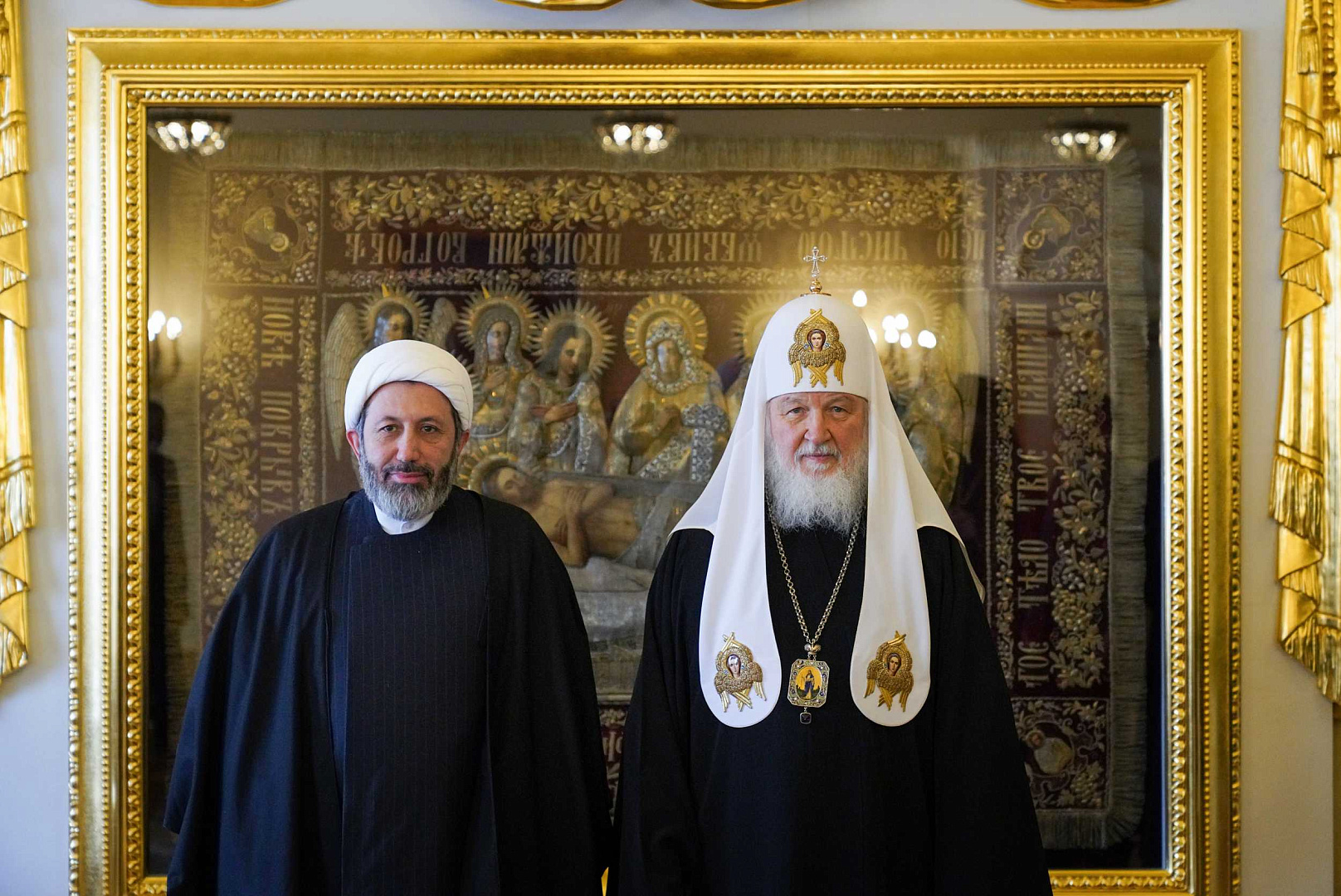
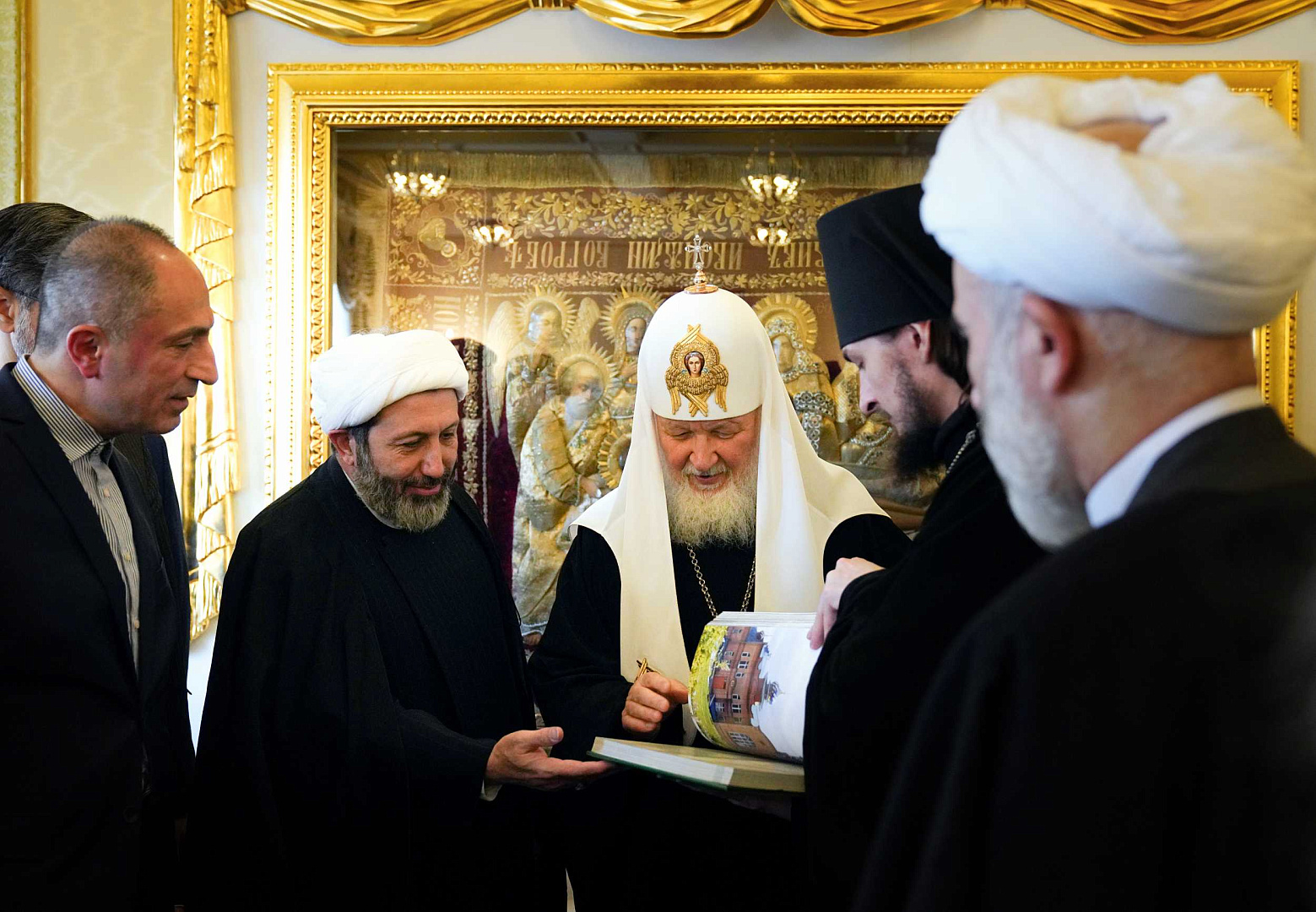
DECR Communication Service, 22.02.2023.
On February 22, 2023, His Holiness Patriarch Kirill of Moscow and All Russia received in audience at the Patriarchal Residence in St. Daniel Monastery a delegation of religious figures and scholars from Iran who have come to Russia for the 12th session of the Joint Russian-Iranian Commission for Orthodoxy-Islam Dialogue, which completed its first day of work on February 21, 2023.
Participating in the meeting from the Russian Orthodox Church were Metropolitan Kirill of Kazan and Tatarstan, co-chair of the Commission’s ecclesial part; Archimandrite Alexander (Zarkeshev), rector of the St. Nicholas Cathedral in Teheran and the St. Phillip Church in Ash Shāriqah, UAE; Rev. Dimitry Safonov, DECR secretary for interreligious relations; Hieromonk Gregory (Matrusov), chairman of the Patriarchal Experts Council for Cooperation with the Islamic World. There was also M.R. Baranov, deputy director of the Second Asia Department of the Russian Ministry of Foreign Affairs.
From the Iranian side, there were Hojjat ul-Islam Mohammad Mahdi Imanipour, chairman of the Organization for Islamic Culture and Communication in Iran, co-chair of the Commission from the Iranian side; Mr Kazem Jalali, Extraordinary and Plenipotentiary Ambassador of the Islamic Republic of Iran to the Russian Federation; Hojjat ul-Islam Mehdi Bakhtawar, representative of the Iranian Spiritual Leader in Moscow; Prof Fatima Tabatabai, University of Teheran, head of the Scientific Association of Islamic Learning in Iran; Mr. Masoud Ahmadvand, head of the Cultural Representation of Iran in Russia; Mr Hamid Hadawi, President of the Ibn Sina Islamic Cultural Research Foundation; Ms Zahra Rashid-Beigi, leader of the Islam-Orthodoxy dialogue group of the Islamic Culture and Communication Organization in Iran; and Mr Hossein Jahangiri, councillor, Iranian Embassy in Russia.
The Primate of the Russian Orthodox Church warmly welcomed the Chairman of the Islamic Culture and Communications Organization.
‘We already met in 2007. Back then, you accompanied a high-ranking representative of your community while I headed the Department for External Church Relations’, His Holiness said. He gave a high value to the established good tradition to appoint those who had worked as representative in Russia to the post of head of the Islamic Culture and Communication Organization.
In the Russian Orthodox Church, Iranian Moslems are treated with great sympathy and trust, Patriarch Kirill noted, ‘Twenty five years ago, together with the late Ayatollah Taskhiri, we stood at the beginning of the Commission. My visit to Iran in 1995 was also linked with the development of our bilateral relations, and I keep the best impressions of it, he said, ‘In 2020, Ayatollah Taskhiri passed away to another world and we keep cherishing his memory. That same year saw the death of Metropolitan Feofan of Kazan and Tatarstan, who headed the part of the joint working group that consisted of representatives of the Russian Orthodox Church. He was co-chairman of the working group in both 2016 in Moscow and 2018 in Teheran’.
Today, the Orthodox part of the joint working group is headed by Metropolitan Kirill of Kazan and Tatarstan. In Tatarstan, there is a great number of Muslims living in it and a very high level of relationships between representatives of Islam and Orthodoxy, His Holiness pointed out. Metropolitan Kirill also represents the Russian Church in the Strategic Vision Group ‘Russia-Islam World’.
Last December, the Commission marked 25 years since its first in Teheran. ‘These 25 years have not been darkened by any negative circumstances or themes, which would divide us or create difficulties in our relations. For the Orthodox members, it is a remarkable opportunity for getting a deeper knowledge of Islam. This immersion in the Islamic theme helps our Russian Orthodox theologians and, through them, also people to get a better knowledge of Islam and to see in Islam not only friends but also people of the same mind on very important problems of today’, His Holiness stressed.
The Orthodox people and Muslims share much in their attitude to morals, the role of religion in social life, marriage and international relations, His Holiness stated. In spite of the fact that the Christian culture forbids polygamy, the two religions have similar stands on man-woman relations, love, marital fidelity and parenting.
In his response, Mohammad Mahdi Imanipour conveyed to Patriarch Kirill a warm and sincere message of greeting from the President Ebrahim Raisi of the Islamic Republic of Iran and the Supreme Leader of Iran, Ayatollah Ali Khamenei.
He gave a high value to the initiative of Patriarch Kirill and the late Ayatollah Taskhiri reached in 1995 to start a dialogue between Islam and Orthodoxy and thanked His Holiness for having appointed Metropolitan Kirill of Kazan and Tatarstan as the leader of the church part of the Joint Commission pointing to his deep interest in developing the dialogue, cordiality and high authority. They discussed various aspects of the Russian-Iranian relations.
‘I have a feeling that we are making a considerable turn to find ourselves at a very important historic moment. Fortunately, Iran and Russia occupy a good place in this matter. It seems to me that the difficulties we encounter today are caused by the inaction resorted to by the collective West with regard to the place and role of Iran and Russia played on the global level. I believe, Iran and Russia are on the same line today’, Mohammad Mahdi Imanipour pointed out.
‘I would like to thank you for your very bold and wise position on every issue of the international agenda. These days we see more than before insults of shrines. The insulting of shrines or the beginning of attacks on them show that spirituality, religion, morality on the international level have occupied a noteworthy place’, Mohammad Mahdi Imanipour said.
‘The Western hegemony has purposefully taken measures to destroy the institution of family. We can see that each day they disseminate faked and forged comments on family as a whole, disseminate and propagate this in the mass media of the Western countries. Unfortunately, some religious leaders give their support to these comments, which seriously damages this institute as a whole. The second development - they act against the faith of young people; we will speak more on this topic’, Mohammad Mahdi Imanipour said, expressing a hope for further fruitful cooperation within the Joint Russian-Iranian Commission.
This was followed by a confidential exchange of opinions on issues of interest or concern for the both sides. Specific plans were outlined for cooperation in the future. The meeting was held in a confidential and warm atmosphere showing the unity of opinion on many important issues.
In conclusion of the conversation, the sides exchanged tokens of the meeting.
